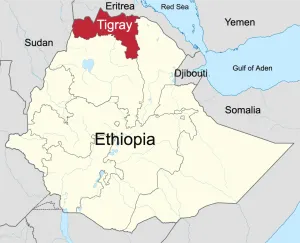Long time old rivals Ethiopia and Eritrea appear to be marching toward war, as saber-rattling has escalated into threats, and troops are massing at the shared border. The Ethiopia–Eritrea tension is fueled mainly five issues:
First:Asmara viewing Ethiopia’s federal government and regional forces (especially in Tigray and Amhara) as potential threat.
Second: Regional competition as Eritrea fears being sidelined in Horn of Africa geopolitics, especially as Ethiopia strengthens ties with Somalia, Djibouti, and international partners.
Third:Internal Ethiopian instability; Eritrea worries that Ethiopia’s internal fragmentation (Oromia, Amhara, Tigray unrest) could spill over.
Fourth: Red Sea issue: Ethiopia, a landlocked country since Eritrea’s independence, has revived demands for access to a Red Sea port—which Eritrea sees as a threat to its sovereignty.
Fifth, The Border issue; Ethiopia has never concerned with the demarcation of the border with Eritrea since it considers Eritrea as part of its territory and one of its regions. When Eritrea was declared independent in 1993, t did not specify the borders of the new state. Isaias Afwerki feared that Ethiopia would return to annex it again by carrying out military actions to demarcate the border, contrary to the American plan, to date the this issue remains unresolved.
The current escalation is likely a growing sense that violent conflict, if not regional warfare, is imminent. Eritrean President Isaias Afwerki, in an interview with Eritrean state media on July 19, accused Ethiopia of preparing for war. He described Ethiopian Prime Minister Abiy Ahmed’s ambition to secure access to a Red Sea port as “the plan of a crazy person.” Getachew Reda, leader of the pro-Ethiopian government faction in Tigray, said in a July 21 social media post that the TPLF is attempting to seize power by force. On the same day, in a military ceremony in Jimma, Ethiopian National Defense Force chief Berhanu Jula warned that a fractured Tigray was on a path to war. He accused the TPLF of refusing to take part in the disarmament, demobilization, and rehabilitation process required by the 2022 Pretoria Agreement that ended the Tigray conflict.
The Increasing friction in Eritrea’s decades-old rivalry with Ethiopia is intertwined with a volatile split among groups in the Tigray region. After Tigrayans and Eritreans fought against each other for two years in the Tigray conflict, some members of the Tigray People’s Liberation Front (TPLF) and officials in Asmara reportedly have forged a new alliance against Ethiopia’s federal government.
In March this year, there were already palpable signs that both Addis Ababa and Asmara are preparing for war. Alarming and credible reports have emerged of military mobilization on both sides of the border. Ethiopia has made substantial new deployments of heavy weaponry and mechanized units in the Afar region, close to the Eritrean frontier and within striking distance of Assab.
The tension doesn’t exist in isolation – it’s deeply shaped by the involvement of both international and regional players who each have strategic, security, or economic interests in the Horn of Africa. It is worth mentioning both Ethiopia and Eritrea are countries that follow America in their policy and their rulers are its agents. This means the mounting tensions between the two old adversaries are between agents or (friends) but under foreign radar. America has been using negotiations to settle their differences.
The frequent tension in the horn of Africa make it easy target for colonial powers i.e., US and Europe especially Britain in terms of political influence, and China in terms of economic influence. Since the region particularly Ethiopia has a huge oil reserves in many areas this has moved US policy towards more attention to the Horn of Africa, especially as Chinese companies have the leading role in the economic and economic exploration and extraction of Ethiopian oil.
Britain through the United Arab Emirates (UAE) has tried to link Ethiopia to its own axis and policy, hoping to influence Ethiopia and Eritrea. The Red Sea & Suez Corridor is a significant route for global trade. It is estimated that roughly 10% of global trade passes through this route; Britain relies on it for oil, gas, and goods from Asia.
Terribly, both Ethiopia and Eritrea are under grip of colonial powers America, China and Europe and hardly any interest is given to them by the Muslims. Both western backed rulers cannot stand in the face US or Europe ambitions to divide the ummah. The only leader who can stand in the face of neo-colonialism is the Khalifah as he is entitled to unite the ummah under the custodian of Book OF Allah and the Sunnah of His Messenger.
By Shaban Mwalimu
Media Representative of Hizb ut Tahrir in Kenya
Saturday 30th August,2025


